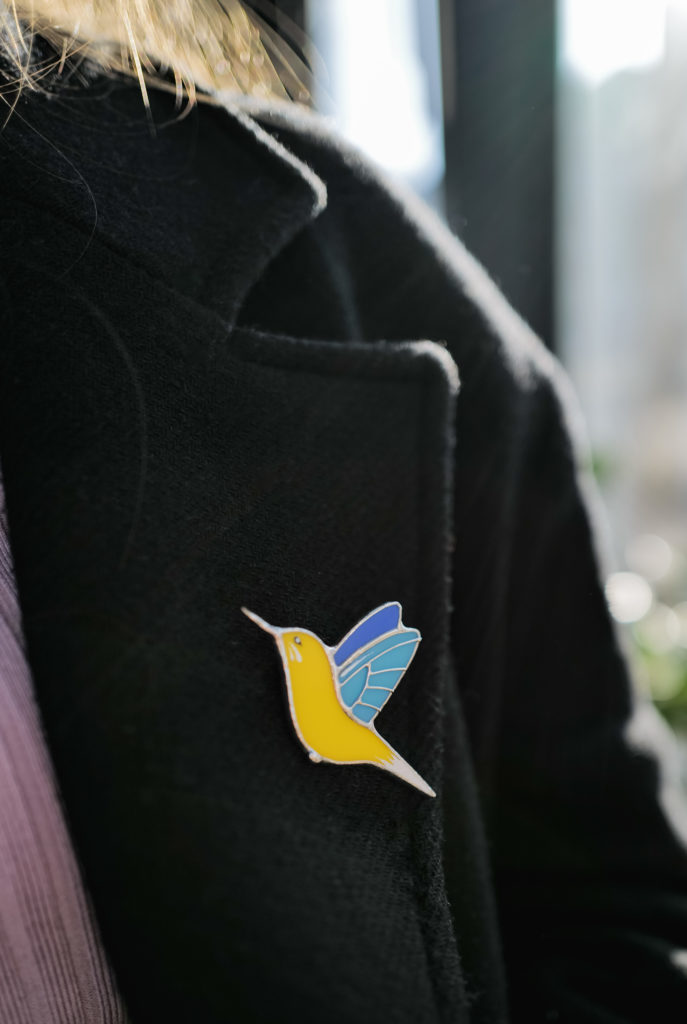I know that your previous interviews for Český rozhlas and Začít společně were conducted in Czech and this is the first one in Ukrainian.
Yes, and it’s much easier now to communicate in my native language than when I was interviewed in Czech in September. Last week, I had another interview on the phone in Czech for Český rozhlas. In the past, I could never imagine I would be interviewed by media and learn a new language so quickly. It was not easy, but life has shown me that you have to quickly navigate, change direction anytime needed and adapt effectively.
How was your life before the war started?
Like any other family. We had our own apartment, we both worked, the girls went to kindergarten. Kira, the eldest daughter, was in the final year of kindergarten and was preparing for school. Tina, the younger daughter, went to the nursery. Kira had been doing gymnastics professionally since she was 3.5 years old, and had trainings 4 times a week for 3 hours. We travelled from time to time. We had a normal family life.
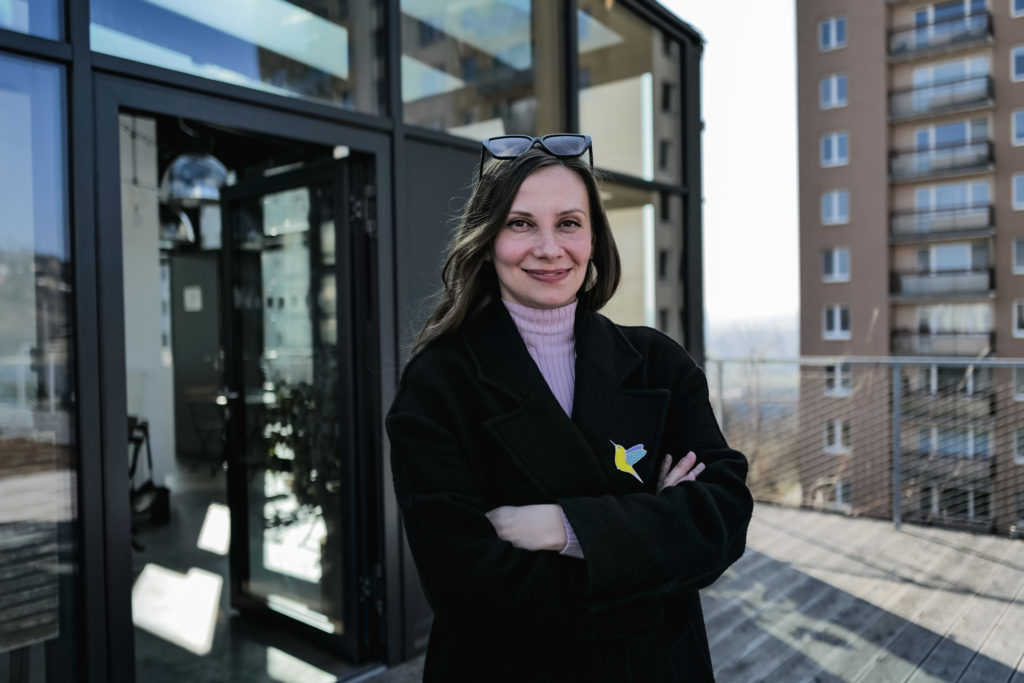
Your husband Maksym stayed in Vinnytsia, didn’t he?
He did. But he’s not at war, he is in the reserve. He passed a medical examination, but since he did not serve in the army until 2022, he has not been recruited yet. Before the war started, my husband worked as a communication coach for employees of Silpo (disclaimer: Ukrainian retail corporation that operates a chain of grocery stores.). Of course, after the outbreak of a full-scale war, this job became irrelevant, and he started volunteering. When Maksym lost his job, he enrolled during the war in a free IT training course for beginners. Later, there was a demand for his field of work again, and he returned to it. Now he works in Vinnytsia in the same area of expertise for other companies, and things have improved a little over the past year.
The beginning of the war was different for every Ukrainian. How did you feel on 24 February 2022?
When the war started, we were at home. I woke up at 6am and started to get ready for work as usual. But then I checked the news on my phone, and it was all about the beginning of the war. In Vinnytsia, compared to other cities in Ukraine, there were no explosions, no sirens, nothing. I was reading and did not understand how this could be happening. After a while, my younger sister, who lived in Kyiv, called me and cried because she was really scared.
When did you leave and how did you make such a difficult decision?
When the war started, my father-in-law, whom I loved very much and who was like a father to me, was seriously sick. Because of him, we couldn’t go anywhere, we didn’t want to leave him behind. Today, 3 March 2023, is the one-year mark of his death. I was devastated after his passing. A day later, my husband said that it was time to leave the country, but I didn’t know where to go. At first, we were supposed to go to France, where our relatives lived. Finally, I left with my daughters, my mother and a close friend by bus for Poland. My friend had her close friend in Brno who had been living there for 9 years. That’s why Brno was supposed to be a transit station to rest, put my thoughts straight and move on. Our friends met us in Warsaw and took us to Brno by car. We arrived on 7 March, and on 8 March, I went to the refugee centre to ask about my documents. I got visas for myself and my family. It took us 20 hours to get from Vinnytsia to Warsaw, and we were all very tired, so I decided that we would stay in Brno. And we still live here.
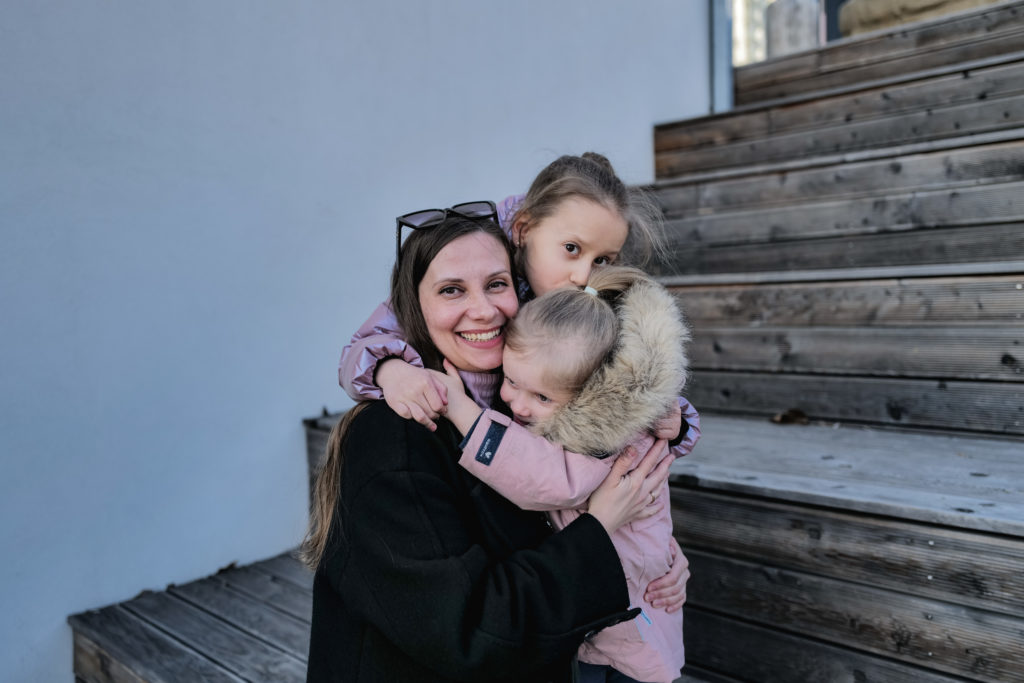
Where did you stay in Brno?
We were accommodated in a hostel in the city centre, and it was free for us for a few days. The owner was very nice and allowed us to stay there for free until we found a place to live. Through a friend of mine, we were helped to find accommodation in the Orel community, a Catholic sports organisation whose office building had been converted into a refugee shelter. We stayed there for a year, and I kept wondering how could I thank the people who had given us refuge. I offered to pay them at least something, and eventually they allowed me to pay a certain amount for utilities. Only last week we moved out of that place to a rented apartment.
How did your daughters adapt to their new life in the Czech Republic?
When we left Ukraine, Tina was 2.5 years old and she simply did not understand anything. On the contrary, it was hard for Kira, because she left everything she had in Vinnytsia: friends, trainings, life. We arrived in Brno on 7 March, and on 17 March I found a kindergarten for Kira. The director of the kindergarten offered me a job as a cleaning lady. I worked as a cleaning lady for 8 months. This period was very hard for me. I constantly saw my daughter walking alone in the kindergarten yard, she often cried and wanted to be close to me. It seems to me that Kira went through a period when she simply did not want to accept the new environment and adapt.
Was the environment not welcoming?
Quite the opposite, but she was not managing anyway. In the first days of kindergarten, we were constantly receiving gifts from the children: sweets, postcards, a mug with a painted Ukrainian flag. One of the mothers from the kindergarten group offered Kira to choose any extra classes she wanted to pay for. Kira chose swimming. Everyone tried to help Kira integrate. It was a very difficult March in 2022, but then it got easier. Kira made friends and started to speak Czech a little bit. There are five Ukrainians in her class. Tina also went to a kindergarten, and my mother is now working there as a cleaning lady instead of me.
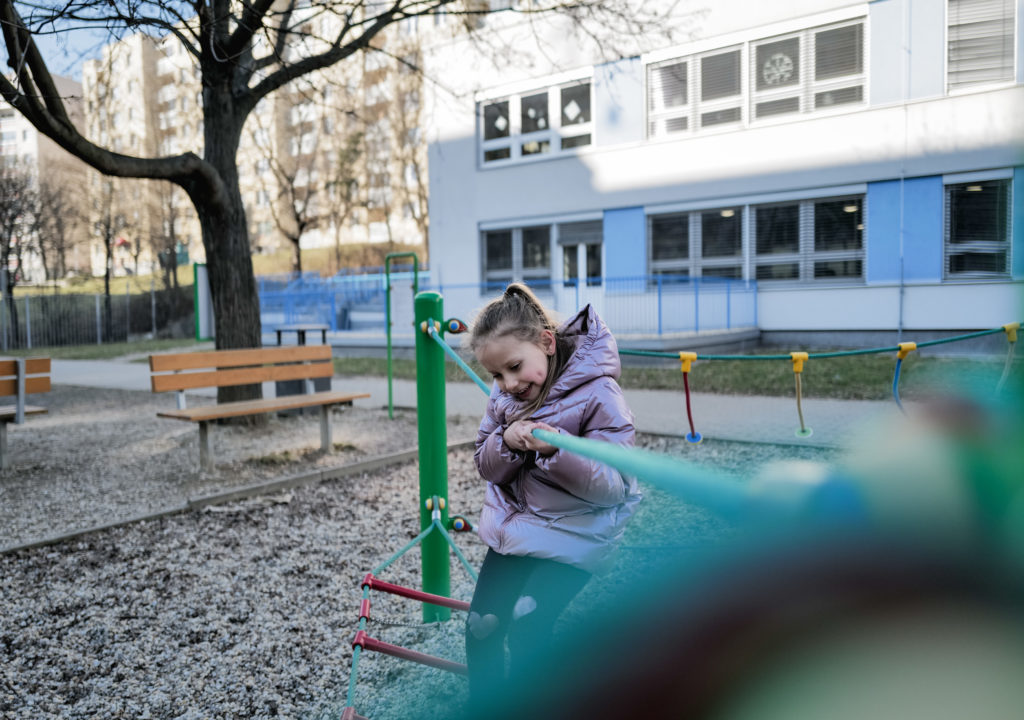
Working as a cleaning lady must have been psychologically difficult, given your education and work experience – in Ukraine, you worked as a doctor. Are you currently working in your field of study?
I had my diploma nostrificated in May 2022. My documents are probably in every hospital to which they could be sent. I worked in Ukraine as diagnostic medical sonographer. In the Czech Republic, there is no separate specialisation in ultrasound, there must be a radiologist who performs CT, MRI and ultrasound. That’s why it was difficult for me to get hired with only knowledge of sonography.
But then, you were told to send your documents to the Czech Ministry of Health.
Exactly. They permitted me to work, but in the format of a practice under the supervision of a manager. I had to find a hospital that had such a supervisor, because not every institution has them. Eventually, I had found such a place, and on 1 August, I was ready to start working there. I resigned from the kindergarten. But just a few days before 1 August, I received an email from the medical institution saying that they had changed their minds and I could not go to work. It was a huge stress for me, because I was left without any income and no prospect of finding a new job. In the evening, I sat down and sent about 40 letters with my CV to different institutions: public clinics, private facilities and other hospitals. I received 5 responses to my letters, one of which was a reply from the owner of a paediatric ordination that I could come for an interview as a paediatrician. I didn’t mind, because I had experience as a family doctor during my internship. Also, it turned out that I could continue my work in the kindergarten for another couple of months. And the nursery was the place that solved the whole situation.
How come?
At that time, one of the mothers who helped Kira in the kindergarten gave me the contact of the doctor who was the head of the department at the Brno Oncology Institute. Every month, he wrote me letters asking how I was doing and that he would help me as soon as he could. On 1 November, I received a letter from this doctor, and it turned out that they had found me a supervisor and I could start working. Officially, I started working at the hospital on 1 March. That is, now I combine a half-time job in the paediatric practice and another half-time job as an ultrasound doctor in the radiology department at the Masaryk Institute.
Could it be said now that you have already adapted to life in the Czech Republic?
When I was leaving, my husband told me that I was moving here only temporarily, but that I should do everything as if I was going to stay for a long time. I believe that children can sense moods. If I was constantly depressed or thinking that we were about to go home, they would feel it too and wouldn’t be able to just live. I still do everything here as if I was staying for a long time. We have found all the necessary doctors, leisure activities, school and kindergarten we need. So yes, I think we have adapted.
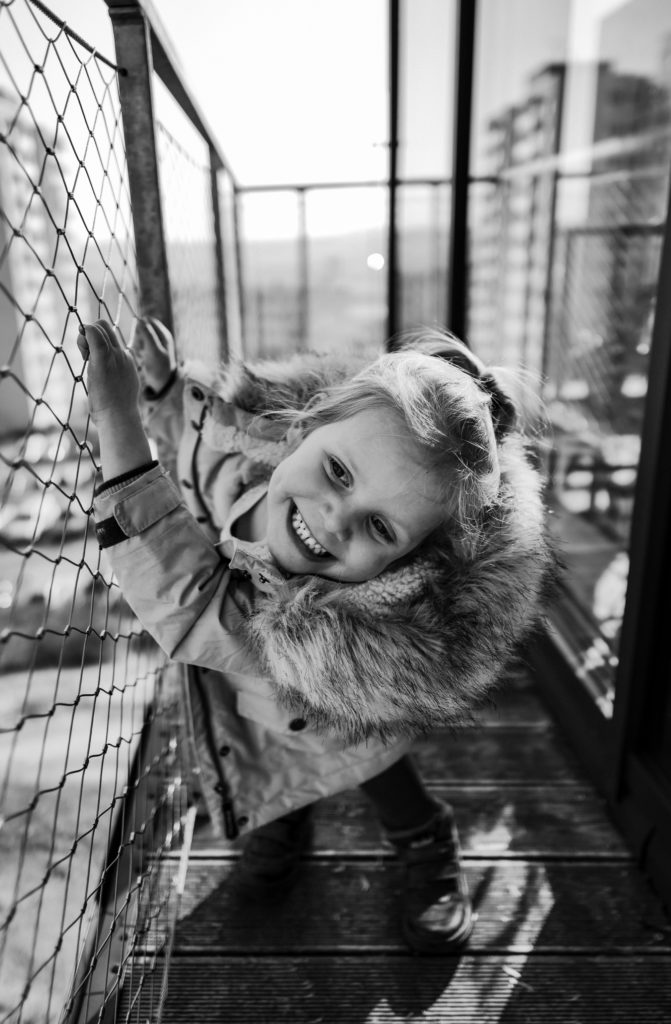

Have you thought about returning home when the war is over?
This is a question that every Czech I meet asks me. I don’t want it to sound wrong. I love our country very much and have always said that it is the best place to live and, certainly, it is my home. At the same time, I really like the laid-back mentality of the Czechs – they are in no hurry and enjoy life. I can’t say that I’m used to living in the Czech Republic, but I have the attitude that it’s for a long time, it should be comfortable and suitable for children. That’s why when asked about returning home, I always answer that I would rather like my husband to come here.
I can see you’re wearing a hummingbird brooch on your coat. Was that a gift?
Yes, from Maksym. We try to keep in touch all the time, and in every parcel, he sends me a note or a small gift. My husband is tall, and I am as little as this bird compared to him. I really wanted to have something Ukrainian with me every time I go out, because I am Ukrainian and I’m proud of it. In fact, I say that everything I’ve done here has worked out only because I’m Ukrainian – we’ve got incredible strength.
